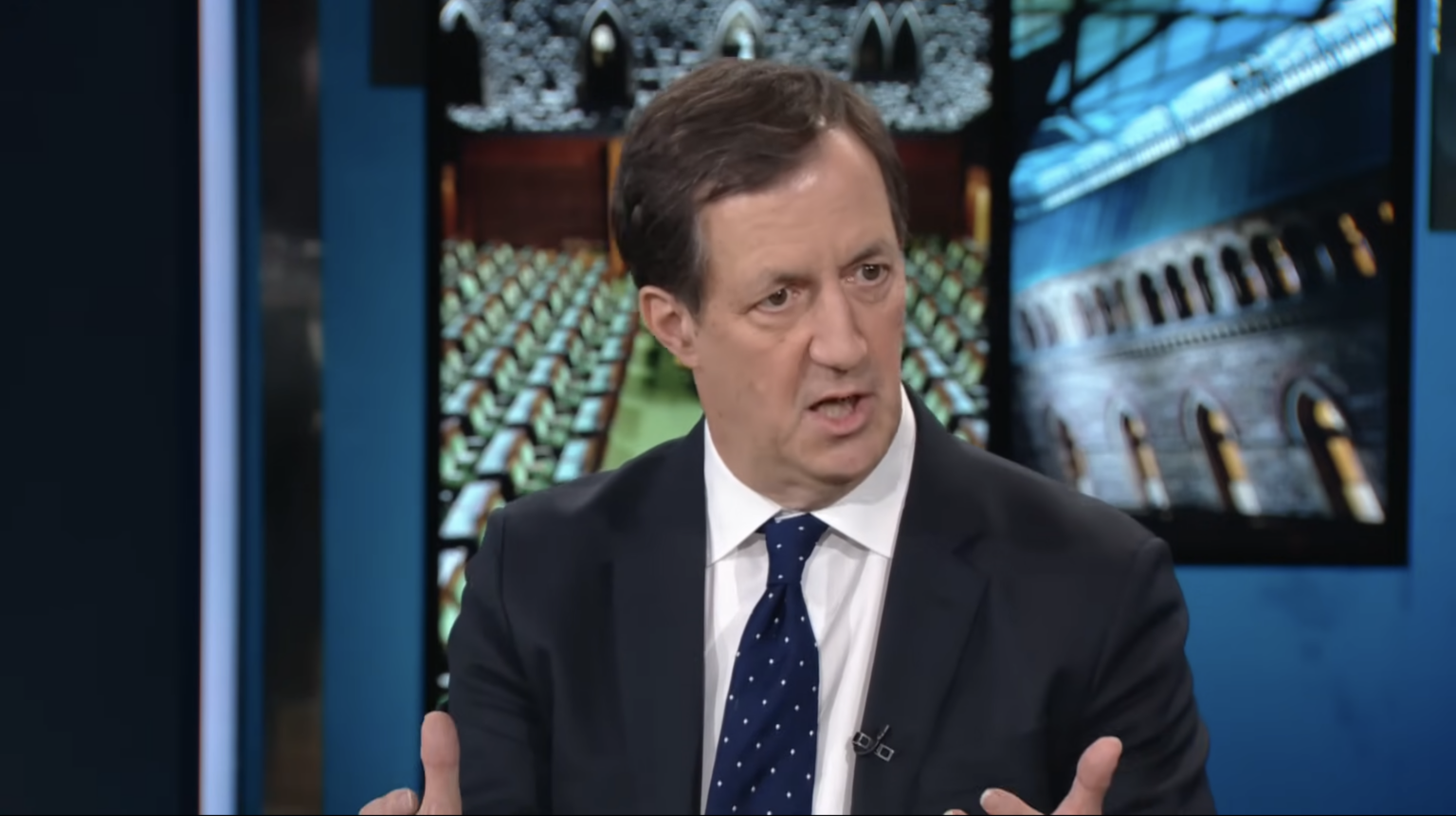One of Canada’s top political journalists and pundits served on the board of a foundation that gave $6.4 million to national groups denying climate change is a crisis, according to federal tax data reviewed by DeSmog.
Records from the Canada Revenue Agency show that Andrew Coyne, currently a columnist at Canada’s national newspaper of record, the Globe and Mail, spent a decade as a director at the Toronto-based Aurea Foundation. From 2006 until the board was disbanded in 2016, those tax records reveal, the foundation gave hundreds of thousands of dollars in charitable donations annually to Canadian think tanks with long records of questioning the science of climate change and attacking government policies that could address the crisis.
Those think tanks include the Fraser Institute, which in 2014 published a paper stating incorrectly that “there has been no statistically significant temperature change for the past 15 to 20 years,” as well as the Macdonald Laurier Institute, whose researchers have argued that “Politicians and others who warn of an impending climate ‘catastrophe,’ ‘cataclysm’ or ‘emergency’ are being unnecessarily alarmist.”
Other recipients of Aurea funding that have downplayed or denied the catastrophic consequences of global temperature rise include the Frontier Centre for Public Policy, the Montreal Economic Institute and the Atlantic Institute for Market Studies (which in 2019 merged with Fraser). They in turn belong to a U.S. organization called the Atlas Network that for years has backed efforts in Canada and globally to vilify climate protesters as dangerous extremists.
“These are some of the most far-right organizations in Canada,” Bob Neubauer, an assistant professor in communications at the University of Manitoba who studies rightwing populism and climate change disinformation, told DeSmog.
Coyne served on the Aurea Foundation board while he held senior editorial positions at the media outlets Maclean’s and the National Post and participated in a widely viewed weekly politics panel called “At Issue” on CBC’s flagship news show The National. His numerous accolades include two National Newspaper Awards and the prestigious Hyman Solomon Award for Excellence in Public Policy Journalism. He frequently portrays himself as an independent thinker, telling The Hub podcast last year that “there are nuggets of wisdom in conservatism and liberalism and libertarianism and socialism, and I don’t see why you have to sort of buy the package.”
Coyne himself acknowledges climate change is real and has argued frequently over the years that the most efficient way to address it is through a national price on carbon emissions. He recently critiqued policies such as Canada’s cap on oil and gas pollution as belonging to “a slew of costly, ineffective regulatory and subsidy schemes.”
But he has only rarely disclosed his personal connection to the Aurea Foundation to his hundreds of thousands of readers, viewers and social media followers. Media scholars and disinformation experts contacted by DeSmog argue that this is a potentially serious omission because an explicit aim of the think tanks that the foundation funded is to influence national media coverage in favor of conservative policies and ideas.
Two of the Aurea-funded think tanks — the Fraser Institute and the Montreal Economic Institute — publish in their annual reports detailed data tracking their media mentions. Based on these publicly available figures, DeSmog calculated that the think tanks were mentioned in print or broadcast media more than 219,000 times during the decade when Coyne was on the foundation’s board. That averages out to roughly 60 mentions a day every day for 10 years. The true figure is potentially higher because other conservative think tanks funded by Aurea don’t provide specific numbers about their overall media mentions.
“Andrew Coyne was in the room of this multimillion-dollar charity, which was funding these think tanks, whose goal is to shape the news,” Duncan Kinney, a journalist and activist who is executive director of the watchdog group Progress Alberta, told DeSmog. “That’s not how journalism is supposed to work.”
Coyne didn’t respond to a list of detailed questions from DeSmog about his involvement with the Aurea Foundation.
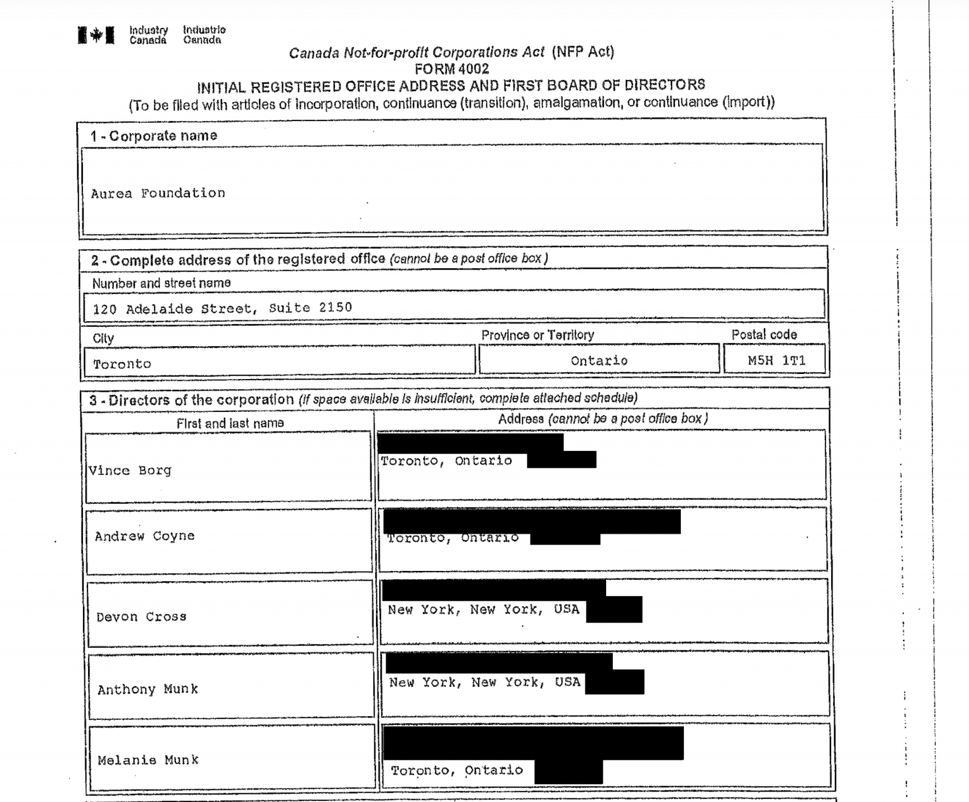
The Aurea Foundation was created in 2006 by the late Peter Munk, a Canadian businessman who’d earlier founded the world’s largest gold mining company, Barrick Gold. Munk’s wealth was reportedly immense. By the time of his death in 2018 he owned at least five homes across Ontario and Europe along with a 140-foot-long yacht called the Golden Eagle. “His associates included Prince Charles; fellow billionaires like Bernard Arnault, the chairman and chief executive of the French luxury goods maker LVMH; and Brian Mulroney, the former Conservative prime minister of Canada,” the New York Times reported.
With an initial $25 million endowment from Munk and his wife Melanie, the Aurea Foundation’s stated goal is “to facilitate exchanges in the marketplace of ideas to the benefit of all who live or aspire to live in free societies.” Over the years it has given to a wide range of organizations, including groups as diverse as the Delta Waterfowl Foundation and McGill University. But its largest donations have gone to organizations with a conservative agenda, according to more than a decade of tax data provided via a request to the Canada Revenue Agency and reviewed by DeSmog.
The charity didn’t respond to a media request.
The Aurea Foundation’s top grant recipient during the period that Coyne served on its board was the Frontier Centre for Public Policy. This Manitoba-based think tank received over $2 million from 2006 to 2016. It is one of Canada’s leading organizations dedicated to denying human-caused climate change and its impacts, Neubauer said.
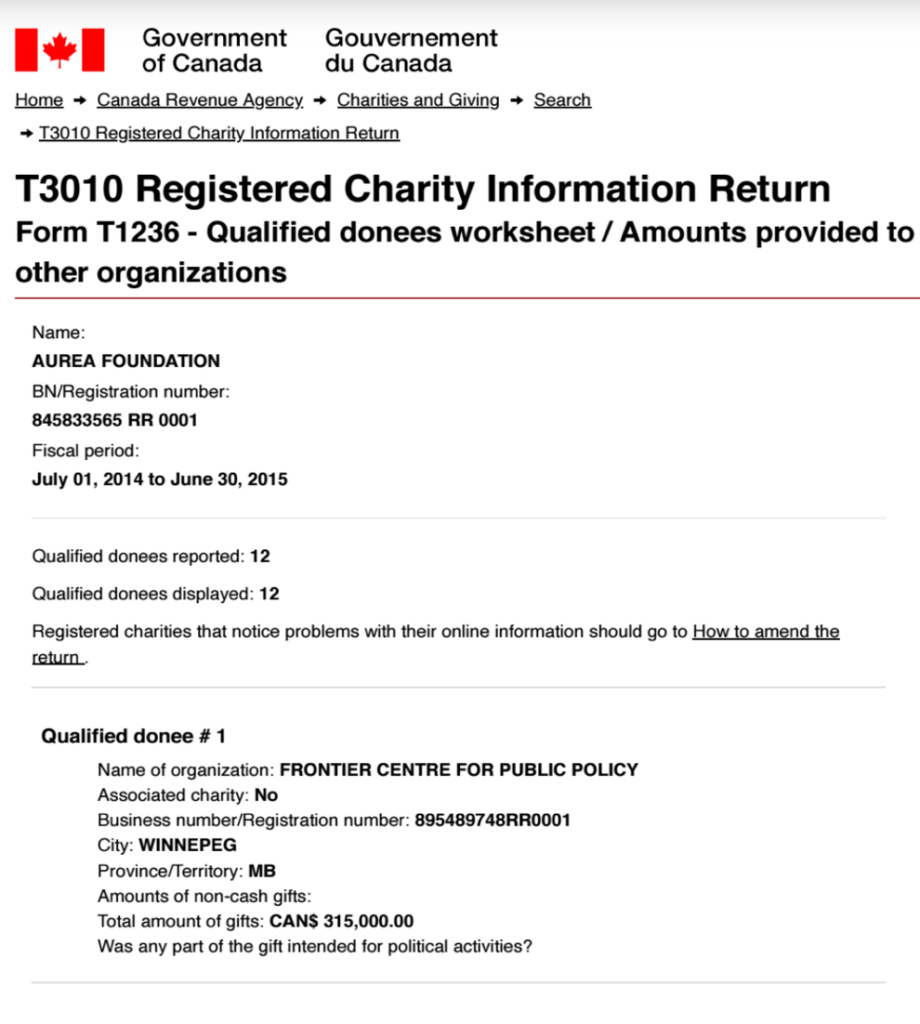
“There is simply no scientific proof that our CO2 emissions are the cause of the slight warming that has occurred over the 300-year period since the peak of the Little Ice Age,” a Frontier Centre commentary claimed incorrectly in 2015, the same year it received $315,000 from Aurea. The group released a report this March claiming that “climate alarmists frequently capitalize on fears surrounding weather events like wildfires, floods, or hurricanes to advance their extremist agenda.” It didn’t reply to questions from DeSmog.
Another major recipient of Aurea contributions was the Fraser Institute, which got nearly $1.8 million during Coyne’s tenure. The libertarian think tank has for decades questioned and downplayed links between industrial activities and global temperature rise. In 2009, a year in which Aurea contributed $160,000 to the organization, the Fraser Institute released a 35th anniversary report bragging that one its biggest accomplishments was bringing “to public attention the uncertainties of climate science.”
To this day it’s still sowing doubt. “Is the strength of evidence sufficient to justify the panic-mongering language of a ‘climate crisis?’” Fraser Institute senior fellow Kenneth Green wrote in an op-ed this March. “In a nutshell, no.” The think tank didn’t respond to a media request from DeSmog.
The Aurea Foundation also gave in 2012 a one-time donation of $38,060 to the Lightfoot Institute, a Canadian group that had earlier published a paper “casting doubt on the validity” of scientific results released by the Intergovernmental Panel on Climate Change, the top global organization for climate research.
“We were not a typical funding example, and so I’m going to decline to comment,” a Lightfoot spokesperson wrote in an email to DeSmog.
These are only a few examples of how groups like the Frontier Centre and the Fraser Institute have for years sought to convince Canadians that human-caused climate change either isn’t real or serious. “They introduce the idea into the public discourse that there could be something wrong with the science, and then repeat it over and over,” Donald Gutstein, a former communications professor at Simon Fraser University who’s written several books about the influence of conservative think tanks, told DeSmog. “That’s a big part of how denial really got established [in Canada].”
To this day, significant proportions of Canadians dispute the scientific consensus on climate change. Only 60 percent of people nationally say that global temperature rise is real and mostly caused by humans, according to a survey last year from the polling firm Research Co., a proportion that drops to just 47 percent for respondents who voted for the Conservative Party.
The Aurea Foundation was making financial contributions to denial groups while Coyne was ascending to the highest levels of Canadian journalism. By 2009, three years after he joined the Aurea board, he was national editor of Maclean’s magazine, which didn’t respond to a media request from DeSmog. Coyne was also a sought out public speaker. The speaking bureau Speaker’s Spotlight described him at the time as “one of Canada’s most provocative and insightful commentators on political and economic issues.”
Coyne moved to the National Post in 2011, where he became a nationally syndicated columnist. The newspaper, which didn’t respond to questions from DeSmog, three years later appointed him editor of editorials and comment, a role in which he would help decide which writers made it into the National Post’s opinion pages. In January 2015, Jesse Brown, founder of the Canadaland podcast, asked Coyne for his views on giving a platform to climate change deniers.
“I don’t have a total ban on that, no,” Coyne responded. “The preponderance of evidence suggests that [climate change] is happening and that the mainstream explanation is the right one. I don’t feel a need to say this is utterly certain and nobody can ever question it. We’re talking about projections of things decades into the future involving modelling the global climate, which is one of the most complex things we can possibly imagine.”
Several months after that interview aired, the National Post ran a column from University of Guelph economics professor Ross McKitrick, who in 2009 had signed his name to a declaration stating “we deny that carbon dioxide — essential to all plant growth — is a pollutant. Reducing greenhouse gases cannot achieve significant reductions in future global temperatures.”
In his Post column, McKitrick incorrectly stated that “on average the observed warming this century was only a quarter what [the Intergovernmental Panel on Climate Change’s] models projected.” In addition to his university position, McKitrick is a longtime senior fellow with the Fraser Institute, which in 2015 — the year he wrote that column — received $80,000 from the Aurea Foundation.
Records show Coyne was on the foundation’s board of directors that year. Yet those linkages don’t appear to have been made clear to readers of the National Post. “It remains troubling,” Sibo Chen, an assistant professor of communications at Toronto Metropolitan University, told DeSmog. “It should be expected that he discloses those types of connections.”
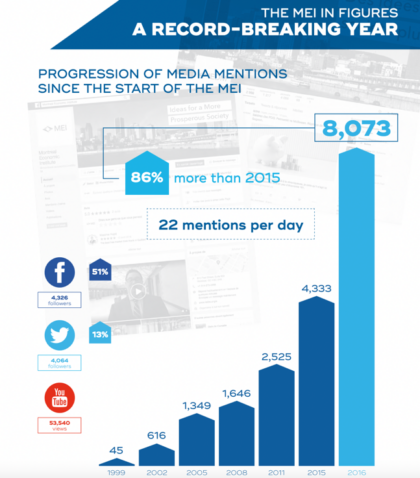
In October 2015, Coyne made national headlines when he announced his resignation as editor of editorials and comment. At issue was that the National Post’s owner, Postmedia, had endorsed the Conservatives in that fall’s election, and when Coyne wrote a column endorsing a different party, the National Post reportedly declined to publish it.
Coyne tweeted that he was stepping down as editor “to protect my reputation and to preserve my editorial freedom as a columnist.” The decision was applauded by some observers as a statement of journalistic independence. “Thanks for maintaining your principles in an increasingly controlled corporate media,” tweeted Green Party leader Elizabeth May.
Coyne remained on the board of the Aurea Foundation, however, and the following year it gave $250,000 to the Montreal Economic Institute, which reported a record 8,073 media mentions in its 2016 annual report, up 86 percent from the year before. That included commissioning a poll trying to build public support for oil pipelines from Western Canada, as well as an op-ed criticizing “green groups” for their “knee-jerk hatred for all things oil-related.” In total the Montreal Economic Institute received $844,200 while Coyne was on the Aurea board. It didn’t respond to questions from DeSmog.
Aurea in 2016 also gave $250,000 to the Ottawa-based Macdonald Laurier Institute. The think tank that year was embarking on “a sophisticated communications and outreach strategy” to convince the federal government to delay implementing the United Nations Declaration on the Rights of Indigenous People (UNDRIP), according to strategy documents obtained by DeSmog and published in the Guardian. The institute feared UNDRIP could allow some First Nations to veto oil pipelines and other natural resource projects on their traditional territories.
“MLI promoted its work through op-eds placed in local and national outlets, media appearances, speaking opportunities, and by directly engaging Aboriginal organizations and government officials,” the documents explain. The think tank as part of this project had released reports painting First Nations anti-oil and gas activists as potentially violent members of “warrior societies.” It didn’t respond to questions from DeSmog.
This specific initiative was funded in part through a grant from the Atlas Network, a libertarian coalition with nearly 500 partners worldwide, including major U.S. climate crisis denial organizations such as the Heritage Foundation and the Manhattan Institute. The Cato Institute, another prominent member that for years denied the scientific basis for climate change, was founded by oil and gas billionaire Charles Koch. The Macdonald Laurier Institute is a member of Atlas, as are other Canadian conservative think tanks funded by Aurea.
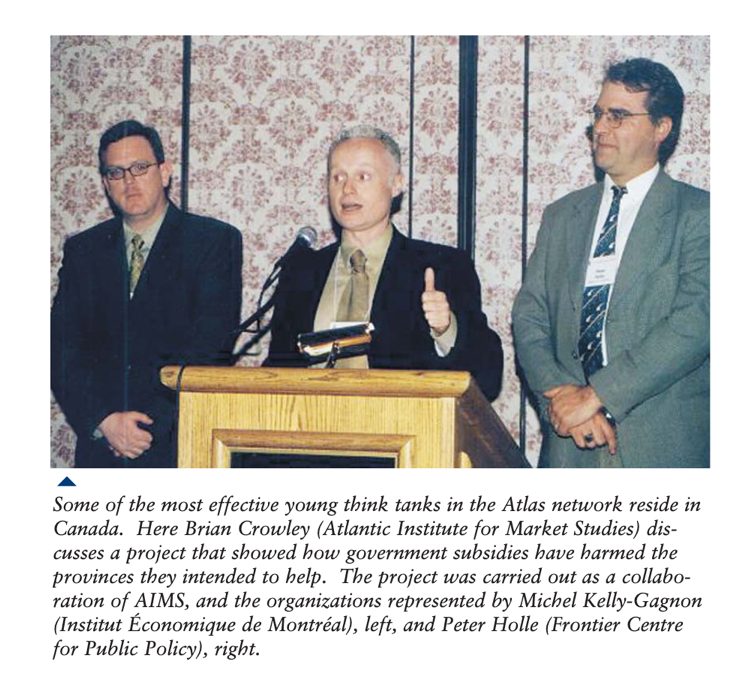
“It’s a very powerful network, it’s got tremendous reach,” William Carroll, a University of Victoria sociology professor who co-directed a research initiative focusing on climate disinformation called the Corporate Mapping Project, told DeSmog. “They direct their messages primarily to mainstream media.”
Coyne has more than funding ties to Atlas Network members. He first met the current managing director and founder of the Macdonald Laurier Institute, Brian Lee Crowley, when they were attending the London School of Economics in the early 1980s. Crowley later created the Atlantic Institute for Market Studies (which received $647,500 from Aurea during Coyne’s time on the board). Crowley was featured in a 2002 report from the Atlas Network, along with leaders of the Montreal Economic Institute and the Frontier Centre for Public Policy, which Atlas described as “some of the most effective young think tanks in the Atlas network.”
Coyne later wrote the foreword for Crowley’s 2016 book, Fearful Symmetry, describing Crowley’s “intellectual honesty; his unblinking openness to facts and reasoned arguments, even those that contradict his preconceptions; above all his fearlessness.”
Crowley’s Macdonald Laurier Institute received over $1.1 million from the Aurea Foundation while Coyne was on its board. The journalist praised the think tank in a 2018 tweet, calling it “a fine organization that does lots of valuable work, even if you disagree with their findings.” In that same tweet he made a rare public acknowledgement of his role at the Aurea Foundation, stating that the “board was disbanded in December 2016.”

Canada Revenue Agency records confirm that Coyne was no longer on the board starting in 2017. Tax records show that Aurea gave an additional $6.8 million to Atlas Network-affiliated think tanks in Canada from then until 2021. By that point Coyne had moved to the Globe and Mail, where he is currently a national columnist. The paper’s standards editor didn’t respond to questions from DeSmog about Coyne’s prior involvement with Aurea.
As unprecedented wildfire smoke engulfed eastern cities from Ottawa to New York last summer, Coyne used his column to make an argument seemingly at odds with the scientific consensus. The out-of-control fires, he wrote, “are probably not the result of global warming.”
As evidence he linked to a study from the Canadian National Fire Database, which he interpreted as showing “a declining [fire] trend over the past 30 years, even as global temperatures have continued to rise,” adding that he believes the evidence for climate change being real is “overwhelming.” It was a curious argument from one of Canada’s most recognizable opinion journalists and political pundits, given that as wildfires continued to burn throughout the summer, eventually causing mass evacuations of the cities of Yellowknife and Kelowna, climate scientists consistently made the case that drought and extreme heat caused by human-induced warming was a major factor in the blazes.
An August study from a scientific consortium called World Weather Attribution calculated that climate change may have doubled the severity of eastern wildfires this year.
But Coyne wasn’t the only one advancing a contrarian view of the summer’s fires. The same day that his Globe column appeared, the Frontier Centre for Public Policy put a blog post on its website contesting the connection between climate change and wildfires and linking to the same Canadian National Fire Database study as Coyne. That post was authored by Gregory Wrightstone, who in 2022 argued that “the science, facts and the data, [do] not support these claims of a climate crisis, of tragedy, of manmade-driven catastrophe.”
Subscribe to our newsletter
Stay up to date with DeSmog news and alerts


